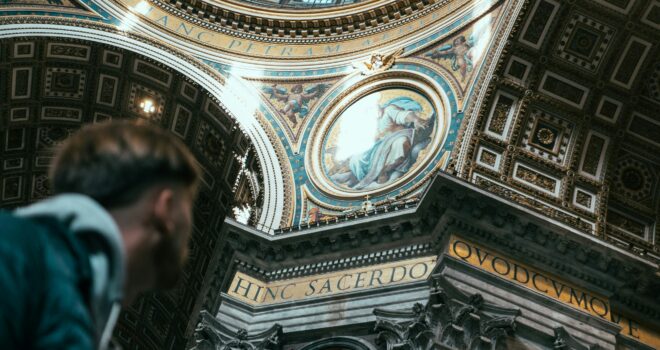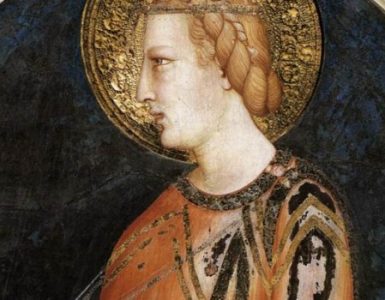A few years ago, one of my friends decided that she would like to study philosophy. She asked me to ask a priest I am friends with, who is a retired philosophy professor, if he would be willing to teach a course to small group of students. As he enjoys teaching, he readily agreed, and my friend and I told several of our friends and acquaintances about the upcoming classes. About ten people came; most came regularly. The professor, Father Julian Davies, OFM, taught us in the same way as he would have taught a college-level class, but the class was less formal, as we did not have to take any tests, write a paper, or receive a grade. Our only homework was to read the assigned chapters and handouts. None of us had studied philosophy before and it was wonderful to learn something new, something that would be useful to our understanding of theology and help us in thinking clearly. The students often asked good questions and Father Julian replied with insightful answers. We had interesting discussions, and when the initial course ended, we wanted to continue. That first class led to more classes. Each time, some of the same students came and some new students joined us. Each class had a mixture of ages: young adults, middle-aged students, and seniors. All participants have been faithful Catholics. Every year, we have had one or two courses with about ten classes. We have met in the Franciscan Friary where Father Julian lives, at the homes of two of the students, at a local college, and at a church. The courses have covered the philosophy of the human person, medieval philosophy, metaphysics, applied ethics, the influence of philosophy on Catholic theology, and existentialism. We have been enriched by our philosophy classes. It is a great gift to read and understand the writings of great Catholic philosophers such as Saint Augustine, Saint Thomas Aquinas, Saint Bonaventure, and Blessed Duns Scotus, and to learn from them.
This year, we are studying theology with Father Julian. He is currently teaching us about the Fathers of the Church.
I think Catholics need to organize more informal classes, workshops, and lectures. Many Catholics do not know our Church’s culture: her theology, philosophy, literature, history, music, art, etc. Many people are not receiving a true education and much of what they learn is meaningless. They may have degrees, but they are not truly educated. In his book, Old Errors and New Labels, Venerable Fulton J. Sheen wrote, “Can we say that a man is truly educated who is ignorant of the first principles of life and truth and love – which is God?” While learning is not a substitute for prayer, it is part of our formation in the Faith. Studying philosophy, theology and Catholic literature may provide insights that will help us in our spiritual life.
Although there are excellent classes and lectures available online, I think it is very beneficial and very Catholic to meet for class in person. God created us to be in community with other people and meeting in person is a way to resist the new unhealthy lifestyle of living our lives through technology, instead of living a real life, interacting with other people who are in the same room with us. We learn from our interactions with each other. One person may have a question or make a comment about an idea that the other students had not previously considered. We might also have meaningful conversations with each other after class about what we learned, which also contributes to our understanding.
There is often a misunderstanding about the purpose of education. It is not training for a job, but a way to gain knowledge. As Saint John Henry Cardinal Newman wrote in The Idea of a University, “Knowledge is capable of being its own end.” He defined knowledge in this way. “When I speak of Knowledge, I mean something intellectual, something which grasps what it perceives through the senses; something which takes a view of things; which sees more than the senses convey; which reasons upon what it sees, and while it sees; which invests it with an idea.”
There is an attitude in contemporary society that because we can easily look up information online, everyone can easily attain knowledge. But the ability to find information is not the same as knowledge, which develops over time, from learning and thinking about ideas. Taking a class from someone who believes in the truth of the Catholic Faith and who has had years of experience in teaching his subject will give us a greater opportunity to develop knowledge and understand what we are learning than reading about the topic on our own, watching a video, or taking an online class.
While it can be good to receive academic credit, and a degree, it is not always necessary. What is necessary is to keep learning, at every age, all our lives, using the gift of intelligence that God gave us, and especially to learn all that is true. Although more Catholic parents are teaching their children about their faith and Catholic culture by homeschooling, adults need this instruction too. As many schools, colleges and universities offer indoctrination in liberal ideas rather than true knowledge, we need to find alternative ways to learn in community. Catholics can organize our own classes for ourselves, and anyone we know, whether or not Catholic, who might be interested in coming to learn with us. There are probably many priests retired from active ministry, as well as retired lay and religious professors, and mothers at home with their children who would be interested in sharing their knowledge with others. These courses could be held in churches or in people’s homes. It is very important to know, not only the Church’s teachings, but also our culture as Catholics and to share it with younger generations. Already, too much has been forgotten as Catholic culture is not taught in many schools or colleges and universities. Organizing classes is also a way to resist the modern agenda of erasing the past, as many libraries and bookstores no longer have many books written in the past, and the media and education usually provide a false view of Catholic history or ignore it.
We were made to know the truth and to live in the truth as Jesus is Himself the Truth. Whenever we have the opportunity to learn and grow in knowledge, we should make the effort to do so.
Photo by Dmitry Tomashek on Unsplash










